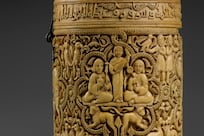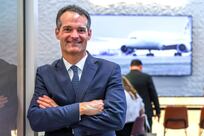SANA'A // The Yemeni government has sought the help of the popular Egyptian television preacher Amr Khaled to launch a battle against radical and extremist ideology in the country.
Mr Khaled, an influential and moderate Muslim preacher known for wooing young crowds in a high-pitched voice, said his one-year campaign was meant to influence Yemen's youngsters and engage them in the fight against extremism.
He said about 50,000 people yesterday attended his sermon on the importance of moderate Islam at Al Saleh mosque in the capital Sana'a.
"The objective of this project is to uproot and spread moderation and the true Islam that was brought by the Prophet Mohammed. Yemen is a country with a deep-rooted civilisation that has been hit by terrorism. We want to present a good picture of Yemen and win the hearts and minds of its youth in this battle," Mr Khaled said in an interview on Thursday in Sana'a.
Mr Khaled, whose modern style trades clerical robes for sharp suits and laces sermons with references to the internet and sport clubs and who appeals to youths across the Arab world, is confident in his approach.
"It is big challenge but I think we will succeed because we are depending on the youths to confront extremism. Violence does not succeed in confronting violence, and governments alone will not succeed in confronting it," he said.
The campaign will involve training about 100 young people who will create about 50 projects to educate and raise public awareness about "the real Islam", Mr Khaled said. These projects include establishing a website to confront extremist ideology. The youth trainees, to be selected from different regions in Yemen, will, in turn, train others who show an interest in the projects.
"We think that a lot of youth, many of whom are away from the public affairs in Yemen, are positive, ready to do something for their country and confront extremism. We are going to train them to do this. And we are confident that in one year we can make the difference," he said.
About 100 preachers and clerics will also receive training in preaching proficiency and eloquence to help them confront extremist ideology in their sermons.
In addition to juggling an insurgency in the north and a separatist movement in the south, the Yemeni government is struggling to combat a resurgent wing of al Qa'eda. The group is considered to be a serious threat by the US after the botched attack on a US-bound plane in December and the US-bound parcel bombs in October.
Under pressure from the US, Yemeni government forces have launched attacks against al Qa'eda militants in recent months, without much success.
Mr Khaled, who has received a warm welcome by the Yemeni president Ali Abdullah Saleh and his top officials, said that he and 15 other clerics involved in the awareness project would lecture university students and military personnel during their 10-day visit to Yemen.
According to Mr Khaled, the project is funded by the government as well as donations by Yemeni businessmen. He said the youths would generate funding from the private sector.
Hassan al Lawzi, Yemen's information minister, said the project would help distribute the message.
"It is a call to the youths to understand the right concept of Islam, which is the religion of peace," Mr al Lawzi told reporters during the launch of the project in the port city of Aden on Wednesday.
However, Mohammed Ayesh, a well-known writer, said fighting extremism required a review of government policies, which employ religion in political battles.
"The government needs to make a serious effort in reviewing its policies which used religious groups against each other, or against its political opponents," he said, describing the result as a flourishing of radical groups.
Mr Ayesh said government needed to review its education curricula, and media and mosque rhetoric which encourage radicalism, as well as its coalition with extremist groups.
"It is only this way that a crackdown on extremism and terrorism can be fruitful," he said.
Mr Ayesh also said the move was a response to the western pressure on the government to address the roots of terrorism.
"The government would like to give an impression that it is not only cracking down terrorism, but also on extremism, as the West has recently begun to focus on the need that Yemen addresses the roots of extremism," he said.






